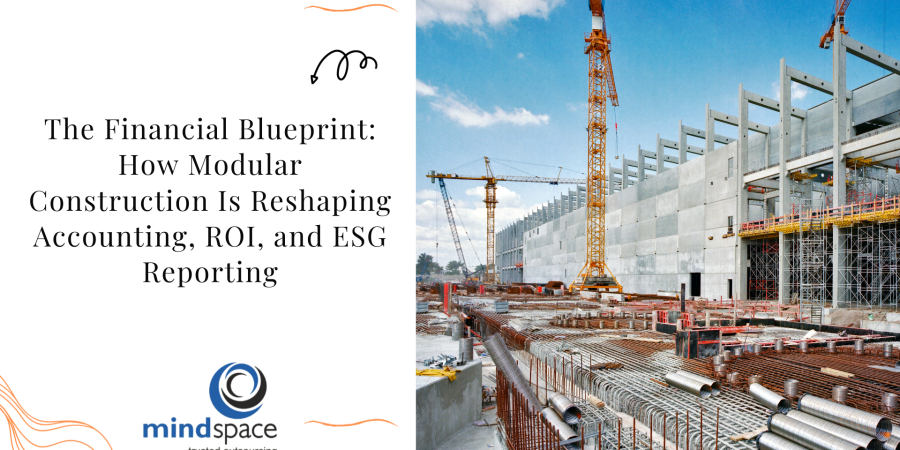The Financial Blueprint: How Modular Construction Is Reshaping Accounting, ROI, and ESG Reporting
Introduction
Modular construction is more than a building trend—it’s a financial disruptor in construction technology. As CFOs, developers, and project managers adopt AI in accounting, finance automation tools, and real estate digital transformation, modular building creates powerful advantages in cost control, ROI optimization, and ESG reporting. Positioned at the crossroads of green construction, construction fintech, and predictive analytics in finance, modular construction is driving a new era of efficiency and transparency.
Accelerated Revenue Recognition & Cash Flow Gains
Faster Turnaround = Earlier Profits
By combining on-site groundwork with off-site modular manufacturing, projects move to occupancy faster than traditional builds. This leads to speedier revenue recognition, improved cash flow forecasting, and sharper financial reporting automation, which ranks high among construction finance trends in 2025.
Lower Financing Pressure
Shorter project cycles reduce both borrowing periods and construction financing costs, enhancing profitability and lifting ROI. For investors in green real estate, the reduced interest burden strengthens project viability and accelerates payback.
Cost Accounting & Efficiency Improvements
Precise Cost Tracking
Because modular construction lowers material waste and reduces dependence on manual labor, it strengthens cost accounting accuracy and delivers stronger profit margins. These efficiency metrics are central to sustainable construction accounting models.
Bulk Procurement at Scale
Modules allow centralized procurement of key resources, giving ERP automation software better oversight of spending while maintaining consistent cost accounting benchmarks.
ESG-Focused Efficiency
Reduced waste aligns with carbon accounting, sustainability KPIs, and green building certifications, allowing companies to demonstrate measurable ESG progress through sustainability reporting software.
Forecasting & Predictive Analytics
Predictable modular timelines power data-driven financial planning and analysis (FP&A). This enables AI-powered accounting tools to feed real-time dashboards for CFOs, fueling cash flow optimization and budget variance analysis. Modular adoption also supports predictive analytics in construction finance, giving businesses improved agility.
ESG Reporting & Sustainability Accounting
Sustainability Compliance in Action
By reducing energy usage and waste, modular projects make it easier to hit ESG compliance targets and qualify under green finance frameworks.
Lifecycle Cost Efficiencies
The ability to repurpose modular units extends asset lives, improving capital expenditure planning and unlocking long-term ROI in green construction projects.
Regulatory & Incentive Benefits
Many modular builds qualify for ESG-linked tax incentives, carbon credits, and sustainability-driven financing, giving companies a measurable advantage in construction compliance reporting.
Risk Management & Compliance Assurance
Minimized Warranty Claims
The factory-controlled environment of modular reduces defects, lowering post-construction risk exposure and warranty liabilities.
Audit-Ready Systems
Standardized inspections strengthen construction audit compliance and align seamlessly with financial reporting regulations, a growing priority in construction finance transformation.
Flexibility, Scalability & Digital Finance Integration
Modular + Automation
Hybrid modular models integrate with ERP accounting systems, AI bookkeeping tools, and digital construction platforms. This fusion reflects the broader digital transformation in construction finance.
Project Scalability
From multifamily residential units and healthcare construction to commercial towers, modular adapts across scales while feeding construction cost data into advanced financial analytics platforms.
Challenges & Financial Trade-Offs
-
CapEx-Intensive Upfront Costs: Calls for careful project financing strategies and amortization planning.
-
Logistics & Transportation Costs: Require careful handling in project-based accounting software.
-
Perception Challenges: Addressed with ROI-focused financial models and construction fintech solutions that highlight modular’s financial advantages.
Conclusion: When Modular Meets Financial Innovation
In 2025, modular construction bridges construction technology, AI in finance, and sustainability accounting in ways never seen before. Developers gain faster paybacks, investors benefit from optimized ESG-linked returns, and accountants enjoy cleaner compliance reporting with finance automation solutions. For the construction industry, modular construction is the blueprint for green, profitable, and future-ready financial management.


